Distritos (Pozos)
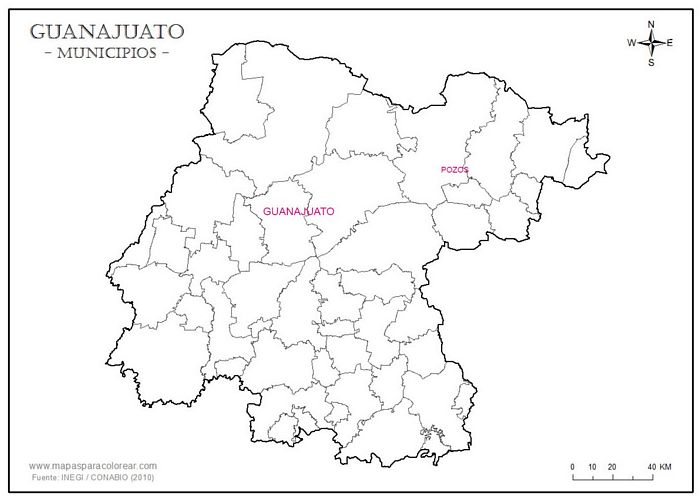
Pozos is a mining town, located in the middle of a semi-desert, with a landscape covered with mesquite trees.
The district made two issues, under the Presidencia Municipal of Juan Manique, both valid until 31 December 1915. The first was guaranteed, half of its value in notes of legal circulation and the other half in the dos caritas of Villa, while the second was backed by the Tesorería Municipal.
Muncipio de Pozos
There seems to have been three different semi-series of the first issue, entitled 'Municipio de Pozos'. One (5c and 10c known) had a simple design:.
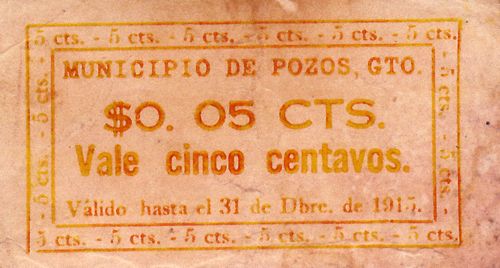
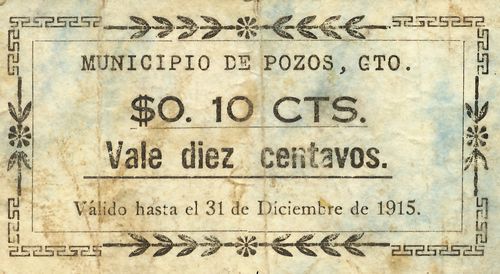
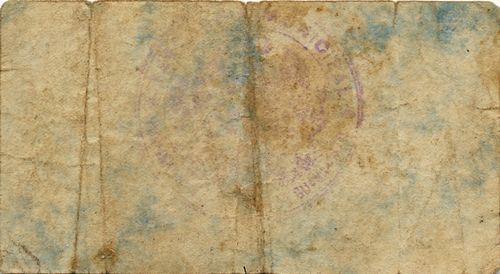
Another (5c and 20c known) had additional Roman numerals:
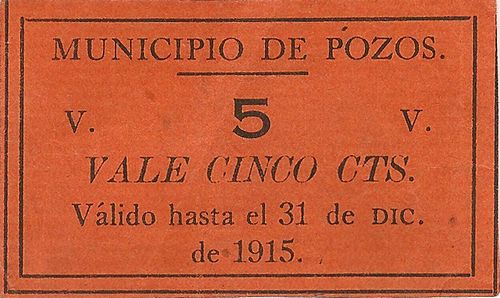
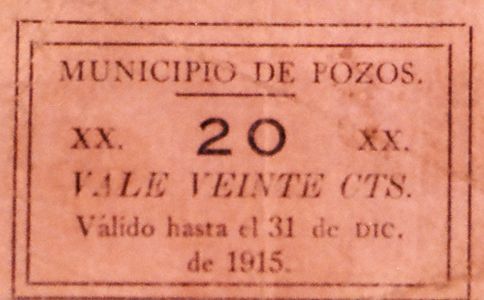
while another more professional note (20c), also valid until 31 December 1915, was printed by the Imprenta S. Tristan, in San Diego de la Unión, some 60 kilometres distant from Pozos.
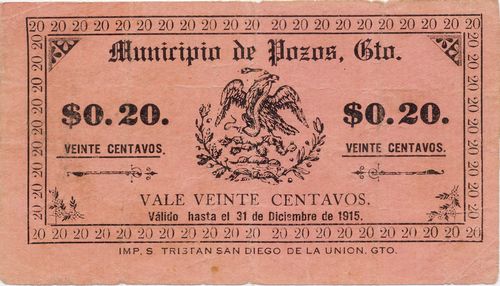
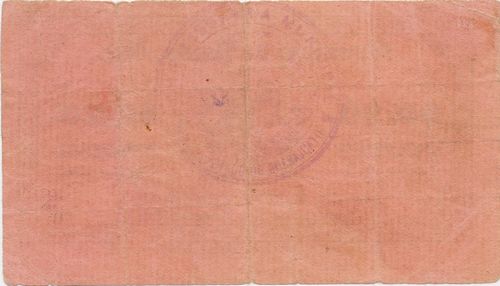
| from | to | total number |
total value |
||
| 5c | unnumbered | ||||
| 10c | unnumbered | ||||
| 20c | unnumbered | ||||
Distrito de Pozos
Another series was entitled 'Distrito de Pozos' and stated that it was issued by agreement with the Supremo Gobierno del Estado. Known values are 10c and 50c.
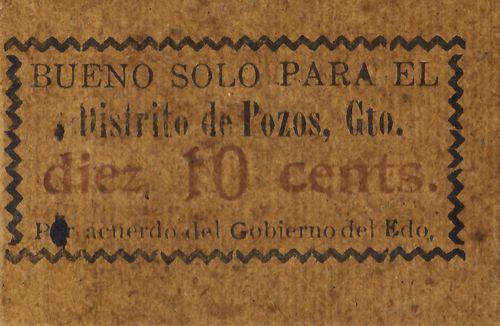
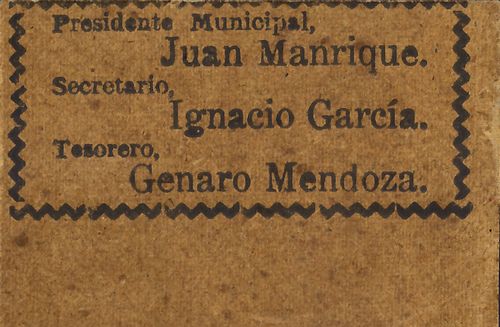
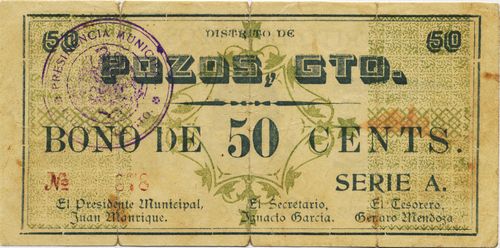
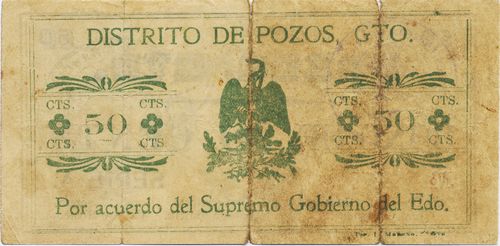
| series | from | to | total number |
total value |
||
| 10c | unnumbered | |||||
| 50c | A | includes numbers 454 to 1669CNBanxico #11039 | ||||
These carried the names of Juan Manrique as Presidente Municipal, Ignacio García as Secretario and Genaro Mendoza as Tesorero.
| Juan Manrique | |
| Ignacio García | |
| Genaro Mendoza |
The total issued was $4,150AHEG, Fondo Secretario de Gobierno, Secciones de Gobierno, Primer Departamento, 1915, caja 9.
These issues continued in circulation after 31 December. However when Major Roberto Sepúlveda took over as presidente municipal from Manique, and found out that the funds guaranteeing the issue was in Villista notes, he felt that the issue was no longer guaranteed and, in agreement with the Junta de Administración Municipal, decided that it should be withdrawn from circulation by 12 March 1916. He reported this to the Secretario General de Gobierno on 13 March, who replied on 4 April that Sepulveda should send the Villista notes with a list of their numbers and values.ibid..
Manrique, who had become presidente municipal of Romita, some 150 kilometres away, was annoyed by this (and by Sepúlveda’s other actions that encouraged disorder) and complained to the governor, José Siurob, but the governor replied that Sepúlveda had claimed he had done so because the issue was not fully guaranteed and so a threat to the local economyibid..
On 12 May Sepúlveda sent $1,618.70 in Villista notes and $15.00 in one $1 note and some cartones that had been guaranteeing the issue. Sepúlveda reported that $754.59 in notes had been redeemed, but he did not send these, as they formed a rather large package and were almost unused, but had deposited them in the Presidencia Municipal for the governor to decide what to do. He did include $1,770.71 in receipts that had been paid out of the guarantee fund, but the government only recognised the invoice for $28.44 from the printers and returned the rest, as they should have been paid by the Tesorería Municipal and not out of the guarantee fund, which, as its name implies, should be kept intactibid.. It seems that the invoices and the Villista notes were returned.
On 6 June 1916 a band of rebels, under the command of Santiago Huerta, who called himself a Zapatista general, and Albino Urquiza, raided the town and demanded money from the Tesorería Municipal and the Recaudación de Rentas, and from the Angustias mine and local businesses. The Tesorero went into hiding, with the key to the safe, but the rebels got the blacksmith to prise it open.
From the Tesorería Municipal they took $350 in infalsificables and $169.80 in Ejército Constitucionalista, Veracruz Gobierno Provisional de México and cartones. They also took $3,000 in Gobierno Provisional notes (almost all in $20 notes, and most of them without a resello) that comprised the guarantee fund for the local issue, and $2,000 in these local notes that had been exchanged to remove them from circulation because of the poor quality of the paper.
They also took $716.20 in infalsificables, $14.50 in notes of General Obregón and $51.80 in Ejército Constitucionalista and Gobierno Provisional de México notes from the Recaudación de Rentas; $2,500.00 in coins (tostones) and $5,000.00 in Gobierno Provisional notes from the Negociación Minera de “Angustias” and $905 from business and individuals (though they had originally demanded $10,000ibid..
So this local issue was still in circulation in May 1916.
